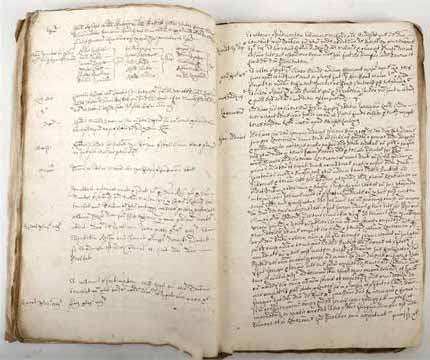
Pitney Lortie manor minute book (late 17th century) sold at Chiswick Auctions, and bought by Somerset Heritage Centre (South West Heritage Trust) following notification. We reminded the vendor of the Manorial Documents Rules and brought them to the attention of potential purchasers.
Most archive services acquire new material for their collections and make them available to researchers through longstanding arrangements, very often by transfer from their governing body, or by deposit from businesses, families, organisations and individuals.
However, manuscripts and archival collections do come up for sale. This is sometimes through specialist auctioneers and dealers, but increasingly through non-specialist antique dealers and amateur sellers, almost always online. When important documents are put up for auction how can we help ensure that they go to the right archive service – somewhere where they can be seen in context alongside other, similar material and where researchers will be able to access and enjoy it?
The sales monitoring service, which is run by the Archive Sector Development team here at The National Archives, was set up to support this effort.
In the last sales year, we monitored around 350 catalogues from over 100 sources. Where we see lots that fit within the collecting remit of one of the UK’s archive services, we notify that institution so that they can decide whether they want to buy the manuscript or collection.
Unique overview
The unique overview our work gives of all aspects of the buying and selling of archives means that we have real expertise on the value of archival material, collecting practice across the archives sector and also how the market in manuscripts works.
Sales monitoring is at the core of what we do, supporting a range of work around archives as cultural property. We use the expertise we gain from monitoring to advise:
- grant-awarding bodies on manuscript cases
- the archive sector on dealing with the market
- central government when significant archives attract financial incentives through the tax system,
Our aim is always to make sure that important material – and the stories that it can unlock – are preserved and made available.
Grant awarding bodies – such as the Arts Council/V&A Purchase Grant Fund, The National Heritage Memorial Fund and the Friends of the National Libraries – play a vital role in securing significant manuscripts for UK institutions.
The advice we give these bodies looks at whether the seller is asking a fair price; whether the material is important enough to justify purchase; and whether it fits well with the purchasing institution’s collecting policy, and will sit alongside related material which will enhance both the evidential value of the purchase and the collections it joins.
Our knowledge of archives across the country helps us advise the funders on whether a repository seeking to buy material can look after it to the right standards, and whether they will be able to make it available for research. This helps us secure the maximum impact for the funds available and helps funders feel confident that they are making the right decisions with their limited resources.
All of this very practical knowledge is also useful to archive services who want to buy manuscripts. Most repositories buy very rarely, so we make sure that we can support them to make good, confident decisions. This means giving them a clear steer on how much the item is likely to cost, helping them to understand bidding strategy and also finding the right funding packages, all of which help to raise their chances of being successful.
Laws and taxes
We use our specialist knowledge about the current values of documents and collections to advise the government on cases involving tax incentives for owners selling or donating archives to public institutions. We also advise on export cases and export policy, since all manuscript material over 50 years old which is not the personal archive of the seller is subject to export licensing, regardless of financial value.
The market in archival material is relatively lightly regulated, and the majority of professional dealers are happy to work within the limits of legislation. Nevertheless, we look out for documents which should not be sold on the open market (primarily public records, sealed tithe documents and parish registers). We send copies of the Manorial Documents Rules to be distributed when a manorial document is offered for sale, reminding purchasers of their obligation to notify the Manorial Documents Register of document movements and the prohibition on export of manorial documents.
As we noted at the beginning, the market is increasingly in the hands of non-specialist antique dealers and amateur sellers. Such controls as there are on the movement and sale of manuscripts are less familiar here. We monitor online auction sites partly to reassure the archives sector and the public that significant manuscript material is not being lost in large quantities through these channels, but we are always happy to advise on material which causes concern or suggest an appropriate repository for material at risk of dispersal through the manuscripts market.

[…] techadmin on August 25, 2016 Tracking the market in manuscripts2016-08-25T08:15:08+00:00 – Journals & Publications – No […]
And of course to identify documents which may have been lost/’removed’ from archives.